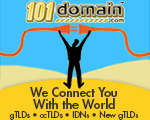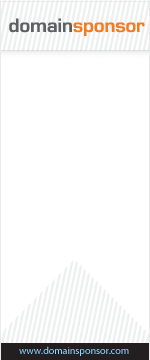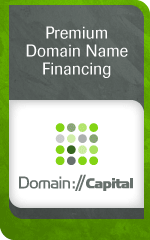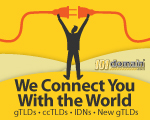|
|
|
Our
2017 Panel of Experts |
|

|

|

|

|
|
|
|
|
|
|

|

|

|

|
|
|
|
|
|
|

|
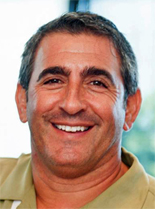
|
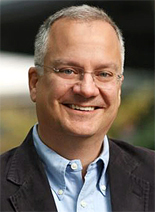
|

|
|
|
|
|
|
|

|

|

|

|
|
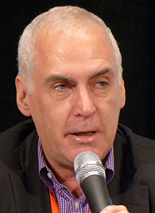
|
Row
1: (L to R): Mike
Mann (DomainMarket.com), Ilze Kaulins-Plaskacz (ExcellentDomains.ca),
Braden Pollock (LegalBrandMarketing.com), Gregg
McNair (PTL Group).
Row 2: (L to R):
George Hong
(Guta.com),
Giuseppe Graziano (GGRG.com), Tessa Holcomb (Igloo.com),
Alan Dunn (NameCorp).
Row
3: (L to R): Kate
Buckley (Buckley Media Group), Monte Cahn (RightOfTheDot.com),
Paul
Stahura (Donuts Inc.), Jothan Frakes (NamesCon).
Row
4: Bill Sweetman (NameNinja),
Scott Reynolds (Payoneer.com), Stevan Lieberman
(Greenberg & Lieberman), Zak Muscovitch
(DNAttorney.com).
Row
5: Phil Corwin (Legal
Counsel, Internet Commerce Association).
|
Domain Investors
Mike
Mann
Domain Investor, Entrepreneur (MikeMann.com),
Founder at DomainMarket.com
We'll
start with commentary from domain investors who make their
money through buying, selling, monetizing or developing domains.
One of the most well-known and outspoken people in that field is
Mike Mann, the original founder of BuyDomains.com who now
operates the DomainMarket.com sales platform. Mike has also
been involved in some of the biggest domain acquisitions and sales
of all time and he has been the subject of
two DNJournal Cover Stories -
the first in our first year of operation back in 2003
and the
second in 2007. Mann has made his fortune with .com
domains and has been one of the biggest critics of the hundreds of
new gTLD challengers that have launched over the past couple
of years.
|
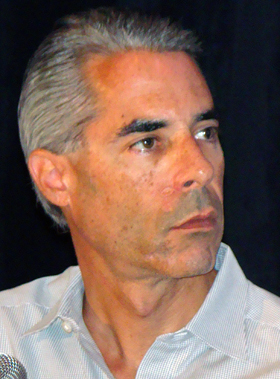
Mike
Mann
Founder, DomainMarket.com |
"Google
“Mike Mann gTLDs” to see my old predictions and
if I hit the nail on the head so far!," Mann began.
"The utter failure of the gTLD fad has been
punctuated by the .blog launch, which had almost no
consumer interest, even though it’s one of the best,
comparable to the other best, .web .app .store
– but I don’t see anyone using those so far either, or
any of the thousand+ others, except scammers and spammers
and long shot speculators."
"All Fortune
500 companies still prefer .Com; plus America’s
other top executives and best marketers, and will never
have a good cause to change, so won’t," Mann opined.
"There are seemingly endless .Coms for sale on the
secondary market for fair prices. Plus longer or more
creative .Com can still be registered super cheap, that
are better brands than almost any gTLDs, and less
expensive."
".Com
also has consistent registration pricing and
history and companies and people and customer service and
routing and brand recognition and branding value and a
history of secondary market sites, apps and players." |
|
"Other
businesspeople around the world in random gTLD domains or
country domains who want a professional international
presence online will “fly to quality” and “risk
aversion”, and will want to be led to the “safest
assets”....i.e., we will see an even greater flight to
quality .Com with further acceleration of their
professionally appraised values, and sales prices! (just
the ones that really have true value today)."
"Any
site or email address that really launches with a new gTLD
domain or country code domain without owning the .Com will
confuse the general public users and add more value for
the owner of the corresponding .Com," Mann continued.
"So CoolDomain.com owner becomes worth more if
somebody mistakenly buys CoolDomain.sucks and builds a web
presence."
"When
the smartest people in the room at Google offices
tried to convince me .soy was going to be the next big
thing a few years back (ostensibly millions of Latinos
would have to have it) I knew everyone was going to be
hosed on gTLDs across the board. Of course they didn’t
hear me, and don’t hear me currently, but what’s
new," Mann said.
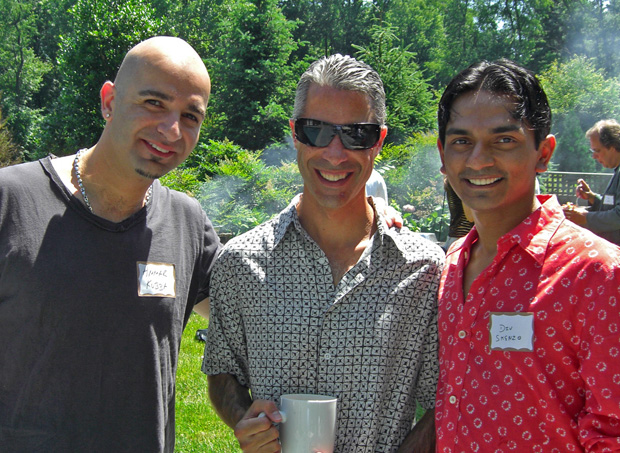
Mike
Mann (center) with Thought Convergence CEO Ammar
Kubba (left) and DivyankTurakhia (who sold his
company, Media.net, for $900 million late last year) at a
party Mann hosted at his suburban Washington, D.C. home
during the 2009 Domain Roundtable conference. (Photo courtesy of Richard Meyer)
Asked
about the keys for success in 2017 Mann said, "Getting
better information and appraisals out there. Better
leadership, best practices, web sites, and web apps at
"co-opetitioning" companies."
"The
gTLD “industry” will radically transform and consolidate
and delete assets; and change their investor perspective and
press narratives. We won’t see or hear from some of
the pissed off investors and snake oil salesmen any longer.
.Com will still be king and increasingly treasured. The Industry
overall will consolidate. New players and apps and
capital will compete to do so."
In closing Mann added.
"Please see these cool sites for great free info to
guide you forward www.MakeMillions.com,
www.MikeMann.com
, www.DomainMarket.com
and www.AppliedEvolution.com.
Check me out on social media and Google if you dare. If you
can handle the truth. It’s not always pretty but it
usually pays!" |
Ilze
Kaulins-Plaskacz
Founder, ExcellentDomains.ca
Ilze
Kaulins-Plaskacz is a veteran domain investor based in
Canada who was profiled in our September 2015 Cover
Story. Ilze also started out as a new gTLD skeptic as
well but her position has been gradually changing on that
front.
|
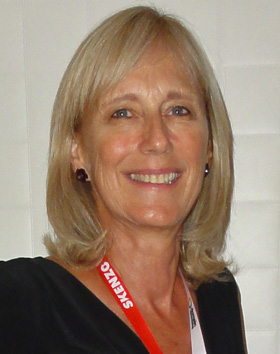
Ilze
Kaulins-Plaskacz
ExcellentDomains.ca |
"You don’t need a
crystal ball to see that the new gTLDs have made an
impact on our industry and will continue to do so
in 2017," Ilze said. "Anyone who knows me knows
that I was never a fan of the new extensions. I feel ICANN
has fragmented and diluted the market, without lending any
significant marketing support. However, there seems to be
a strong upward trend with the new gTLDs, but how long it
will last cannot be predicted. There were 16 million
new registrations in 2016. How much is invested
speculation by Domainers and how much is real demand by
End-users? How much do heavy discounts skew the
numbers?"
"The lack of promotion
by ICANN could slow down the growth of these new
extensions. If new registrations level out, or trend
downward, all players will need to re-evaluate how
long they will stay in the game. For Investors, renewals
are expensive, and in my opinion, the Aftermarket is not
really there to justify the risk. Speaking from the
perspective of an Investor, if I were to take any risks on
these new extensions, I would pick the most generic
extension to flip, and I would make sure is was very, very
short. In 2016 short, numeric domains continued to sell
well and I expect that trend to continue in 2017." |
|
"The
good news is that I am seeing many new faces at the
Domain Industry events. Breaking into the domain
investment business takes cash, risk, and a sense of what
the needs are of the general public, as well as other
Investors. I am hoping that these new members of the
domain community do not throw all their investment into
one extension," Ilze said.
"I am
still not seeing the general public embracing the new gTLDs
except for perhaps country codes, and Geos. I have
personally seen the prices paid for my Canadian country
code, .ca, drop slightly since the introduction of
the new gTLDs. I cannot be sure that the new extensions
are the reason, (could be the economic climate, along with
the terrible valuation of the Canadian dollar). The amount
of sales inquires is still the same, but the new
extensions give more options for the man on the
street who wants to set up a website. First time buyers do
not have to rely on a .com or dot “anything” if they
can choose from hundreds and hundreds of new extensions
for the cost of a registration fee. Hopefully, these new
end-users are using the Radio Test, as well as taking in
several other factors before purchasing a yet unproven
extension."
|
"Although I
still feel that .com is still King,
overall, worldwide, and will continue to grow even
stronger, these new extensions are having some
impact. Although inquires for potential sales have
continued to be strong, it is the pricing
that suffers for Investors when there are too many
choices. I see Sellers are dropping prices
more and more instead of sitting on a high priced
domain. All gTLDs are not the same so I believe
the niche domains will suffer in the long run,
while extensions while .club and .vip will
grow. With the Chinese in the mix, there could be
some opportunity here. China was the
strongest player in 2015 but there was a tapering
off in 2016. With the continued devaluation of the
Yuan, I predict that Chinese investors will turn
to the new affordable extensions for investment.
It is reported that China’s government has
approved official licenses from “MIT”, the
domain regulator in China. The lucky extensions
are: .xyz .club .vip I predict that there will be
many more extensions being approved for the
Chinese market. More choice means more
investment."
"I
foresee that 2017 will have the larger players
like GoDaddy and Sedo spending more
time and money promoting the new gTLDs, which has
sorely been lacking since their launch in 2014.
What I have noticed is the on-going dominance in
the Domain Investor market by GoDaddy. 2016
started with speculation about how much GoDaddy
paid for Mike Berken’s portfolio. Reports
started out estimated as high as $35 million!
GoDaddy continued to show its aggressiveness in
the domain market by also acquiring NamesCon,
the premier domain show in Las Vegas. It
will be interesting to see how they use the show
as a domain selling platform in 2017. I expect a
lot more new ccTLD sponsors as well as a larger,
more diverse domain auction platform including
lots of the new gTLDs." |
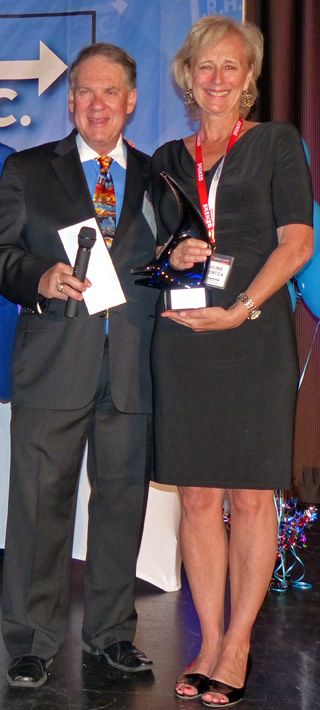
Ilze
Kaulins-Plaskacz receiving the Women in
Domaining Award from TRAFFIC Co-Founder Howard
Neu at the 2014 TRAFFIC East conference in Miami
Beach. |
"2016
also turned out to be a banner year for disputes. I
am personally interested in the UDRP/CDRP process so
I tend to enjoy reading the Complaints and results.
According to WIPO, over 3,000 cases were settled, a 10%
increase from 2015. There is a full 23% increase
in domain disputes as one dispute can involve multiple
domains. Although the .com continues to be the most popular
extension, the following extensions were also part of a
dispute: .cloud, .club, .date, .lol, .online, .shop, .site,
.space, .store, .top, .vip, .website and .xyz. It would not be
surprising to see 2017 surpass the stats of 2016 (and these
stats do not include all the Trademark disputes handled by
other entities, such as Arbitration). With more extensions,
comes more Trademark Infringement. Some of the contributors
of these disputes are overzealous Domainers hoping to hit
the Lottery. The only thing they will get is a Cease and
Desist demand letter threatening a lawsuit," Ilze
cautioned.
"In
conclusion, I still see .com being the most sought after
domain, but I see the new extensions are here to stay.
Maybe not all of them, but the ones that make sense...or
not. (Case in point, .xyz) This industry changes so quickly
and is so interesting, filled with so many friends, and so
many opportunities, that it is my pleasure to be a part of
it!"
|
Braden
Pollock
Owner, LegalBrandMarketing.com
Braden
Pollock (who
was profiled in the November 2011 DNJournal Cover
Story) has found success both as an investor in premium
domains and as a
developer who has turned some of those assets into popular
websites. He is also frequently called upon to serve as a
moderator at domain conferences staged around the world.
|
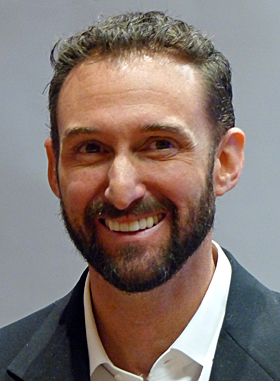
Braden
Pollock
Owner, Legal Brand Marketing LLC |
"A
significant trend in 2016 was GoDaddy's continued acquisition
spree," Pollock said. "The biggest being Host
Europe Group (itself, a roll-up of companies),
furthering their immense grip as the world's largest
domain registrar as well as becoming a massive hosting
provider. They have acquired other hosting companies, Word
Press solution providers, VOIP companies, and
much more. They're even in the conference business now,
owning World Hosting Days and NamesCon. The
on-going roll-up of domain marketplaces and private domain
portfolios hits closest to home. It's virtually impossible
to know how far GoDaddy's tentacles reach now. I would
expect the acquisitions to continue. I've been saying this
for a while; a big player is going to start rolling up
the registries. I would not be surprised when GoDaddy
starts buying up this space. They have deep enough pockets
- and it would make perfect sense to acquire Uniregistry,
Donuts, Afilias or M+M, etc. If you
sell lots of widgets, it only makes sense to start
manufacturing them too."
"Another
trend this past year would be the increase in sales prices
of one and two word .coms. Historically these names
have always |
|
been
a solid investment but this year we've seen a spike
in sale prices. While premium nets/orgs softened over the
preceding couple of years they began to rebound this past
year."
Looking
forward Pollock said, "I expect (and hope for) some
breakout .brand and gTLD ad campaigns in
2017. Every year for the last few years we've predicted
the same thing. Public awareness and adoption may be
coming slowly but it's definitely coming."
"We'll
continue to see one and two character domains selling well
in the aftermarket, particularly across non .com TLDs.
Expect to see high value .net, .org and gTLD sales in this
category - probably into the Chinese market."
"As
parking revenue declines, there may be further
consolidation of parking companies. Additionally,
parking providers will more aggressively employ
alternative solutions such as zero-click and dynamic,
interactive advertising powered by predictive behavioral analytics
(that is, once they get out of their Google
contracts). There will also be a move toward consolidated
advertising platforms such as City Brand Media for
geo domains and what Legal Brand Marketing does for
lead generation." |
Dr.
Gregg McNair
Chairman & Founder, Premium
Traffic Ltd. Group
Dr.
Gregg McNair (who we profiled in our October 2009 Cover
Story) has been far more than a domain investor. He
has also been a major investor in several companies both in and
outside of this industry, especially in the domain monetization
field. While he wears many hats he is now most closely
associated with the Premium Traffic Ltd. Group that he
founded and serves as Chairman.
|
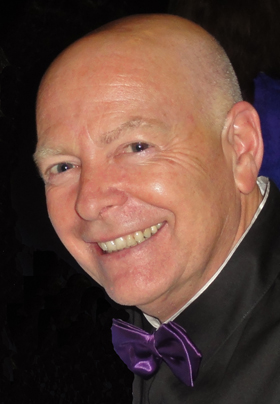
Dr.
Gregg McNair
Founder & Chairman
Premium Traffic Group Ltd. |
"2016
was indeed a great year for those investors and
organizations with a focus on new and emerging
monetization opportunities," McNair said. "Our
group successfully launched Premium Traffic Limited at DomainFest
Hong Kong, during September, a move that combined all
our different platforms into a single business."
"Since then we have made a couple of major
acquisitions to broaden further the monetization options
for traffic owners. If your PPC revenue is static or still
in decline you are obviously missing out!"
"The
continued consolidation of industry sectors and the
scramble among gTLD registries for attention has resulted
in a noisy distraction from which we believe only a few
will emerge with anything like a rosy future," McNair
predicted.
Regarding
2017, McNair said, "As more and more traffic moves
away from established monetization modes I believe that we
will continue to see Google and other search
partners derive traffic and value in other related modes.
The advertiser is King and knows generally what converts
best and will pay accordingly. Therefore the convergence
and combination of the domain, agency and brand |
|
sector will
accelerate in a battle of survival. Of course the early
movers carry the advantage and should maintain their edge
over the followers."
"With
respect to gTLDs I expect to see more floundering
registries to exit and the aggregators like Donuts
and Uniregistry to pick them up. However apart from
a select number of registries it appears to me that many
moons will pass before anyone makes a dime from
gTLDs."
"We
look forward to another amazing year and wish all our
supporters and industry players, large and small, good
health wealth and happiness in 2017." |
George
Hong
President & CEO, Guta.com
Moving
on to the brokerage sector, George Hong, a native of
China with a home in the U.S., is intimately
familiar with key buyers and investors on both sides of the
Pacific, something that has put his company, Guta.com,
in a very strong position over the past couple of years. While the
tidal wave of Chinese buying had receded Hong believes the country
will remain a critically important player on the global domain
stage.
|

George
Hong
President & CEO
Guta.com |
"2016
was all about Godaddy and China," Hong
said. "GoDaddy continued their domain name portfolios
buying spree: the two most significant ones are from DotComAgency.com
and Elite Domains. By buying portfolios as a whole
and selling individual names to investors, Godaddy not only
pumped a great amount of cash into the domain aftermarket,
but also stimulated trading activities."
"Other
than spending money buying domain names, GoDaddy also spent
a significant amount of money elsewhere. The biggest news
would be the acquisition of Host Europe Group (HEG)
which stands for a big step of GoDaddy into European market.
Besides, they spent a fortune advertising on major Sports
events (NFL, NBA, NASCAR, WWE, Poker and Ping Pong). Thanks
to Godaddy, many Chinese TV viewers firstly saw domain name
commercials on nationally televised NBA or Ping Pong games.
GoDaddy’s advertisement campaigns help bringing awareness
to the general public about Godaddy and domain names. These
are the main reasons that we think Godaddy is the domain
company of year for 2016 (as noted in an article
we published)."
|
|
"After a phenomenal
domain sales surging in late 2015 and early 2016, Chinese
domain market slowed down later in 2016 though
Chinese buyers were still actively buying and selling. China
was still the number one country globally for domains
purchasing. For example, when Godaddy sold some domains from
the DotComAgency.com and EliteDomains portfolios people
tracked WhoIs changes and reported that most of the
high value domains (such as 2 letter .com domains) were
bought by Chinese buyers. Guta.com was proud to
broker sales of some domains that include two letter .com, 3
number .com and 4 number .com."
"The
Chinese domain industry rapidly changed in 2016 and I got to
witness these changes real time after spending more than 8
months in China last year. Bulk domain investment, buying
and selling categories of domain names in batch without
knowing/caring the exact domain names ahead of time, is a
trend that got people’s attention in 2015 and continued in
2016. A few example of bulk domain investment categories are
CHIP LLLL.com (“Chip" is an abbreviation of
"Chinese Premium.") Chips typically describe
valuable domain names that contain only premium letters,
known as initials, which exclude the letters a, e, i,
o, u or v.), CHIP LLLL.cn, CHIP LLLLL.com, CHIP LLLLL.cn,
NNNNNN.com, 3/4 letter/number domains in certain new gLTDs.
Bulk domain investment is easier than ever before. People
don’t need to have any prior knowledge of domain names to
participate."
|
"Existing
domain platforms came up with innovative ways to buy
& sell domain in bulk while new domain
platforms, specifically designed for bulk domain
trading, came online one after another. Buying
certain categories of domain names becomes as simple
as buying stocks or bitcoins," Hong said.
"As a result, more and more new investors and
money are drawn to the domain market. At first,
these contributed to the phenomenal surge in late
2015 and early 2016.
However
as time went on, these exact same factors created
major problems and concerns that led to the market
slow down in 2016:
1. The domains involved in bulk domain
investment typically are usually traded among
investors and rarely used in commerce. In this
case, a more appropriate term for bulk domain
investment would be bulk domain speculation.
Few people make huge ROI in a short period of time,
while most people suffer |
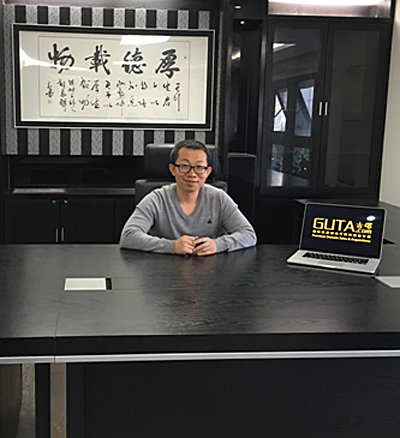
George
Hong at the Xiamen, China office he opened in
2015 (thanks to the China boom that year he moved
to bigger offices soon after). |
|
losses. The quick and
huge ROI potential draws experienced domain
investors’ focus away from investing in premium
domains to bulk domain speculation. The big losses
cause people to lose confidence in the domain market
as a whole. |
2.
Some new investors bring money in to make a quick profit.
These people have extensive experience in trading stocks or
other commodities and they are skilled at handling volatile
market situation. There were price manipulations;
there were pump and dump scams; while many seasoned domain
investors’ impression about domain market that it should
be steadily increasing. All things considered, it is not a
surprise that most experienced domain investors were caught
off guard and lost money speculating.
Looking
ahead to 2017 Hong said, "Bulk domain speculation is here
to stay. Some people will find out the ways to make
money by manipulating the market. On the other hand, many
more people will lose money speculating. Seasoned domain
investors will gradually realize that bulk domain
speculation is a gamble, they will shift their money
and focus back to what they were doing best before: buying
undervalued premium domains and selling them for a
profit."
"In
early 2017, there will be a lot of opportunities to buy undervalued
premium domains such as CVCV.com (consonant-vowel).
Chinese buyers will keep buying premium domains, such as
pinyin domains with good meanings, 2-3 letter .com, 3-4
number .com and other short domains as the CNY currency is
devaluing and there are few other viable investment
alternatives." |
Giuseppe
Graziano
Founder & Managing Director, Lisbon Media, GGRG.com
While
broker Giuseppe Graziano is based in Lisbon, Portugal,
he has also been paying close attention to what is happening in
China and began his commentary with that subject.
|

Giuseppe
Graziano
Founder & Managing Director
Lisbon Media, GGRG.com |
"For
the niche I cover, which is short, liquid .com domains
like LL, LLL, NN, NNN, NNNN, LN & NL 2016 was a year
of transition," Graziano said. "After the drop
in prices at the beginning of the year that extended
throughout the summer, prices seemed to have reached a
support level."
"To
understand if the Chinese buying frenzy will resume, or
the market will stabilize, let’s analyze the factors
that drove the increase in demand and subsequent surge in
prices of 2014-2015:
1) The
long term, sustainable demand of Chinese e-commerce giants
and Internet companies.
It is fair to
say that the first type of demand will stay constant as
the Chinese internet space continues to grow. The
Chinese consumer marketplace is a “go big or go home”
game and companies that want to play in the same league as
Alibaba, Tencent or JD, have to get a
short .com domain. Chinese consumers do not care for
“boutique/independent” brands, but do trust large
consumer brands. A short .com domain sends a “You can
trust us” message to the public, and this is exactly the
reason why record sales like HG.com for $3.75
million will continue to happen. |
|
2) The
short term, speculative demand that came from Chinese
domain investors.
The
speculative short term demand is instead driven by: 1)
profits 2) the availability and profitability of
alternative investments. For what concerns the profits, in
a bull market (as the one of 2014-2015), it was easy for
investors to ride the upward trend. 2016 has shown though
that the price of domain names can also go down,
and many fair weather investors are less confident to jump
in the market again.
Regarding
the alternative investments available to Chinese
investors, we have noticed an inverse correlation in
performance caused most likely by funds allocation: the
2015 Chinese stock crash fueled the peak in prices of
November 15. Bitcoins were surging again while the
demand for domains flattened. As of January 5th, the
People’s Bank of China announced that bitcoins are to be
treated a commodity and not as currency. This made the
bitcoins drop 20% in a few hours. If you consider that the
total market cap of Bitcoins is no more than $16
billion, and that, according to our
quarterly report, the estimated value of the
short liquid .com domains is $8 billion, there is a
chance that this might cause more money to flow back to
domain names." Graziano said.
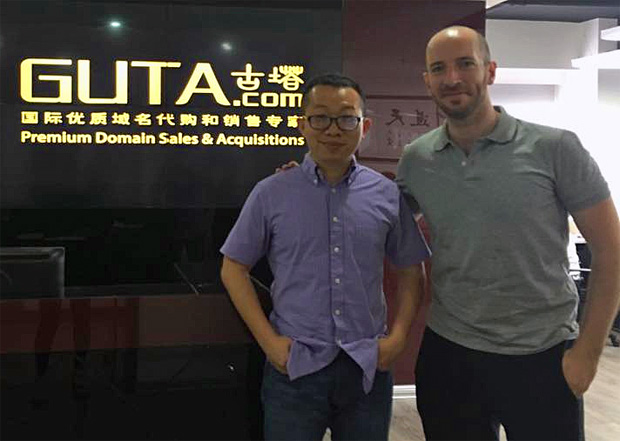
Giuseppe
Graziano (right) visiting George Hong
at George's Guta.com office in Ximaen, China last year.
Looking
ahead Graziano added, "2017 appears to be an uncertain
year from many angles. Besides a difficult political
outlook, US, EU and China have kept printing money, in an
effort to sustain the stagnant economies and improve trade
deficits. It is a currency war to who can devalue their
currency faster and there is a new tendency for investors
to distrust paper currency which is at the whim of central
banks. Europe will have 3 elections this year, including
France and Germany. Some of the parties, like the National
Front in France led by Le Pen are asking for an exit from
the European Union if they were to win. If this were to
happen, the euro zone might be in danger of collapse
and, as a result, the demand for alternative investments
might increase as European investors look to hedge
themselves. Will European investors also look at domain
names as a place to invest?"
"If
we look at last years, this is unlikely to happen.
European investors have more investment options available
to them as opposed to Chinese. As we noted on our
quarterly report, in Q3 only, over 6,000
liquid domains moved from US, Europe and rest of the world
towards China."
"So how is this going to affect domains? Speaking
about the niche I cover, I do not see any significant
change in the end user demand, at least in the
short to medium term. For what concerns the short term
speculative demand, I think February (after Chinese New
Year) will be key to see if the Chinese buying activity
resumes. I would watch closely the bitcoins price charts.
A decrease in the value of bitcoins might signify that
money will be flowing again to domains. Large domain
purchases from Chinese end users might also restore
confidence."
"In
terms of opportunities, there are certainly market
inefficiencies that can still be exploited. For example
domain with vowels are priced significantly lower than the
“chips” - and the international end users do not
necessarily favor the Chinese Premium letter as much as
the Chinese investors do. The niche of LN/NL domains (t5.com,
2h.com, etc) is
priced significantly lower than the 2 letter category,
although they are actually scarcer (520 vs 676) and
present similar development
indexes.
Outside of
my niche, here are a few more trends I see in 2017:
·
Chinese investors
who started investing in 2014-2016 will gradually gravitate
more towards domains that have a higher chance to be sold to
end users.
·
Internet users are moving away from typing on a browser and
onto speaking to a personal assistant on the phone. This
trend is unlike to stop anytime soon and might likely damage
the revenue of traffic domains and monetization companies.
·
India is a place to watch with attention. Using .cn
domains as comparables (being valued roughly at 25% of .
coms), India has a huge potential market and a rising
middle class - we might see the sales prices of premium English
.in keywords go up sometimes soon." |
Tessa
Holcomb
Co-Founder & CEO, Igloo.com
Tessa
Holcomb, who
was profiled in our June 2015 Cover Story, is another accomplished, veteran
domain broker who is no stranger to seven-figure transactions. As
one of the smartest and hardest working people in the space we
always value her insight into current industry trends.
|

Tessa
Holcomb
Co-Founder & CEO, Igloo.com |
"As
an industry, one of our biggest challenges continues to be
pricing, and even more so when there are such
pronounced fluctuations in the market as there were
between 2015-2016," Ms. Holcomb said. "The
leveling off (to put it mildly) of the Chinese Market
created an evident swing in the pendulum putting the ball
back in the hands of buyers and resulting in competitive
end-user sale prices and tremendous investment
opportunities (as publicly noted here
on DN Journal’s 2016 Top 100 Sales Chart.)"
"Many
owners turned down significant offers, holding out for
numbers they had witnessed only months earlier while
others cut their losses not knowing what the future would
hold. Q4 has
always been the strongest quarter for Igloo and
2016 was no different as prices steadily crept up
throughout the end of the year. Stagnant buyers came back
to the table with increased offers and sellers, previously
unwilling to negotiate, responded positively creating a win-win
situation for all."
"Although
the number of companies using gTLDs is on the rise, over 90%
of Igloo’s transactions in 2016 were still .coms.
Startups with higher level funding and businesses of all
sizes
|
|
continue to see the value in
acquiring their one-word .coms and make up a large portion
of our acquisition business along with domain investors
buying both individual names and portfolios," Tessa
said.
"2017 will be an extremely
busy year bringing an onslaught of unanticipated
activity and movement within the industry as a whole. More
companies will come, go, join forces or change direction
than in any year before. We’ll see an increase in the
number of transactions overall with owners, who don’t
normally sell, coming out of the woodwork and more
investments being made either by existing players or new
individuals or groups. With pricing continuing to fluctuate,
we’ll see less Buy It Now Pricing, especially on
the higher end. We’ll see more collaboration among
established brokers and more common practices being shared.
On this front, Igloo has created the Premium Broker
Network as a more formal vehicle to help in the
collaboration efforts between trusted brokers, give higher
end names more exposure at the right levels, and close more
sales at these price points."
|
Alan Dunn
Managing Director, NameCorp.com
Alan Dunn's many
years of successful experience as a domain investor, broker,
consultant, researcher and writer has made him one of the most
respected figures in the industry. He will be profiled in an
upcoming DN Journal Cover Story.
|

Alan
Dunn
Managing Director
NameCorp |
When asked about the key
stories of 2016 Dunn cut to the chase. "China—for a
different reason this year. I think 2016 proved that the
Eastern and Western markets for domain names are completely
different." Dunn said. "This realization has
led many companies to rethink their overall strategy for
the China market (which still has tremendous opportunity),
and has also diminished a lot of noise from people who
were only visitors in the industry looking to make a quick
buck."
"GoDaddy’s
continued portfolio acquisitions were also quite
important, but not just from a sales perspective. These
acquisitions have given some industry veterans a chance to
retire, and with retirement there is often a drop in
shared knowledge. We also lost some great people this past
year. While retirement and loss are both natural elements
of industry evolution, I think that more people realized
the need for a long-term plan this year than ever
before."
With respect to 2017 Dunn
said, "I think we all know demand for premium short
.com domains will continue to rise, supply will
continue to decrease and more competition will enter the
market. (No surprises there, right?).
|
|
"The
biggest challenge for the domain name industry has been (and
will continue to be) a collective voice. Last year,
many companies changed direction, a result that I think can
be attributed to either not having a plan or understanding
the importance of marketing. This is not just limited to
gTLDs, but also includes legacy companies that have failed
to innovate or lead. In 2017, I hope that we can
(collectively) change that."
"Milk has the famous “Got
Milk?” campaign. Cotton Incorporated—which was
founded in 1970 to support U.S. cotton farmers and importers
in the research, development and promotion of cotton—has
the amazing “The Fabric of Our Lives” campaign. Domain
names are the foundation of the internet. Why do
we not have a “Get Online” or “Get Your Name”
campaign that promotes the education of the very product our
businesses are built around? (But not sponsored by GoDaddy,
who we all have to thank for making this industry where it
is today.)"
"Whether it’s .com, .org
or the further maturity of new gTLDs, there is no doubt the
industry (as a whole) is moving forward. Maybe, hopefully,
2017 will be the year we finally make progress
together," Dunn concluded.
|
|
Kate
Buckley
Founder & Principal, BuckleyMediaGroup
It
has been a big year for Kate Buckley. A few days
before this article came she brokered the sale
of Advance.com for $300,000 giving her two of the
20 biggest sales reported over the past year as she also
sold Rate.com for the Castello Brothers last spring
for $725,000.
|

Kate
Buckley
Founder & Principal
Buckley Media Group |
While
the China market has cooled Kate said there are
still the engine pulling the high end domain
train. "Chinese investors now own 26%
of the 676 LL.coms," Kate noted. "They
have money to tie up, and believe domain names are
relatively secure. And they believe in .COMs.
By my calculations, of the 676 LL.coms, half are
in use, the Chinese are using or sitting on
roughly a quarter, and investors are sitting on
another quarter of them. There are probably 160 or
so investor-owned LL.coms out there, which is not
a lot. Seeing what happens with these remaining
LL.coms could be interesting, I believe their
value will continue to rise. I’m brokering one
of them right now, in fact: QO.com."
"Additionally,
this was another year that reinforced the fact
that premium .coms do in fact have significant
liquidity, and are highly sought after by
businesses that desire greater reach and impact
(not to mention consumer resonance) for their
marketing and branding spend." |
|
"VR
(virtual reality) and IOT (the Internet of
Things) are all fascinating to me right now.
And it’s reached the mass market tipping point.
Some in the industry think this will hurt domains;
I disagree. Google and Amazon are
now promoting voice activated call-to-action
services and devices like Echo and Home.
Those words are actionable and will lead more and
more customers to those businesses that have
actionable and memorable web addresses. The future
is still .com."
"Additionally,
I believe that the continued proliferation of new
gTLDs will perpetually raise the value of
premium dot-com names. The reasons are many, but
two of the most important are 1) dot-com
has a long term “trust” factor and 2)
the public always defaults to dot-com when trying
to recall or share a domain name. Some believe
neither is important because search engines like
Google control the game, but the ability to
immediately and accurately recall a company’s
brand will always be paramount to a business’s
success. It’s basic branding and marketing.
Furthermore, I believe that the new gTLDs will
begin to be judged more on the bottom line
(revenue), instead of the amount of registrations."
"The
fact that Fortune 500 Companies, without
fail, invest in dot-coms and continue to do so
drives this point home. As Paul Graham,
venture capitalist and co-founder of the Y
Combinator said, “The problem with not
having the .com of your name is that it signals
weakness.” And, in fact, every single one of the
top 20 Y Combinator companies by valuation have
the .com of their name." |
Monte
Cahn
Founder & President, RightOfTheDot.com Monte
Cahn has been involved in some of the biggest domain
sales of all time and, as an original founder of Moniker.com,
he has been doing it since well before DNJournal began over
14 years ago. Monte is still doing it today as Founder &
President of RightOfTheDot.com, who stages the annual
live domain auction at NamesCon and is also a
well-known consultancy to new gTLD registry
operators.
|
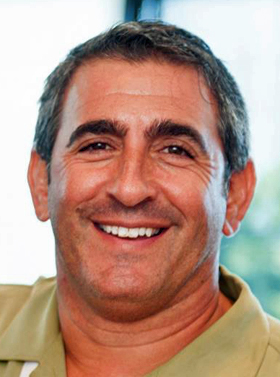
Monte
Cahn
Founder & President
RightOfTheDot.com |
"2016
saw some up and down roller coaster rides with the
drastic swing in the Chinese markets which had
direct affects on the overall domain industry and
market," Cahn noted. "In some ways it was
good by weeding out artificial sales and
transactions from real transactions at real market
values and prices. Speculators were liquidating and
flipping domain assets when they couldn’t
liquidate or monetize other assets due to Chinese
laws and markets, On a side and interesting note, China
was responsible for 54% of all new gTLD
registrations in 2016."
"This
was bad for folks buying higher than market and
trying to flip out as well as those holding out too
long waiting for that higher price that never came."
"On
a more positive note, there were several buy outs of
domain portfolios that were both good for buyer and
sellers - Godaddy (NameFind), Endurance,
and others on the good buying end, my good friend
and former partner Michael Berkens, Monster
Worldwide, CentralNic, Anthos
Chrysanthou / Emerge Media, and others on the
sellers end. Many questioned the per domain
price per domain these portfolios were sold for but
in my opinion |
|
they
were all win win transactions for both sides and put
good spark in our industry when we needed materially
valid and fair transactions for both buyers and
sellers."
"Then
there were some of the company to company buyouts
and mergers and acquisitions involving some of
our friends in the industry. Most notable
was Directi / Skenzo founders Divyank and
Bhavin Turakhia who later formed Media.net
and built it to be one of the largest online Yahoo/Bing
based ad platforms. They sold to a large Chinese
consortium for $900MM - announced in August
of 2016. This couldn’t have happened
to nicer guys and well deserved for all their
continued innovation, hard work and perseverance."
"In
addition, several new TLD companies made
strategic moves in acquiring other new TLD
strings and companies. Afilias
acquired StartingDot domains .archi, .bio and .ski in
August. It was also discovered that Afilias
was the second highest bidder for the public ICANN
auction for the new TLD .Web which Verisign
won through Nu Dot Co. I felt that bid
and the company behind it validated that .Web could
be the next .Com competitor and now compliment to
.Com. After suing ICANN to try to stop the
Verisign .Web deal, Donuts acquired .Irish
at the end of the year. And .Buzz
decided to put their TLD up for sale. I think
some of the newer players in the new TLD space had a
reality check and realized that unless you have big
money behind you, a lot of experience, and / or
efficiencies of scale, its hard to successfully
launch new TLDs and successfully compete in a market
that will take 5-10 more years to survive."
Cahn said.
"Meanwhile
we started off 2016 with the largest industry trade
show and domain auction at NamesCon with over
1,000 showing up in Vegas for great networking,
content and close to $2 million in domain auction
sales. This kicked off a strong year in
individual domain sales in both legacy TLDs and even
new TLDs. Ironically NamesCon ended up being acquired
by WebHostingDays (WHD) who was then acquired
by Godaddy through its acquisition of Host
Europe Group who owns WHD!"
"What
I find so significant about 2016 is how far we have
come since I started in 1995…and how much our
industry has matured since its early starts. Yet
we are still in our infancy with so much bright
future ahead of us!"
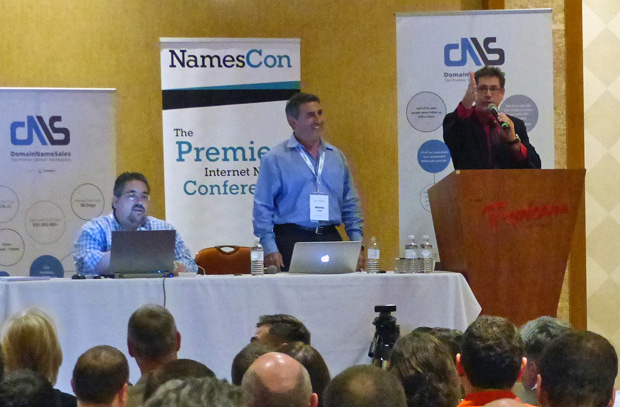
Monte
Cahn
(standing at center) helping auctioneer Wayne Wheat
run the 2015 NamesCon Live Domain Auction. They
also did it in 2016 and will be returning yet again
next week at NamesCon 2017 in Las Vegas.
"2017
will continue where 2016 left off," Cahn
predicted. "I think there were be more strong
domain aftermarket sales, more portfolio buyouts and
more mergers that touch our industry in some way or
the people that helped pioneer it. Although
there will be challenges in the change of US political
leadership, that is likely to be messy in many ways, I
do feel that overall business will be strong as
we move towards less political regulations, lower US
tax rates over time, increase in employment. This will
result in the start of more business opportunities and
more individual and corporate wealth overall. This
will only help overall business and our industry in
the next year and beyond."
"Our
next generation of internet / web users will be
registering new and existing TLDs. There will be
some more big new TLD primary and aftermarket sales
along with legacy .com sales. Both will be
raising the tide water for all and will be good
for the entire industry. Existing .com
speculators will continue to cross lines and register
more new TLDs as more are registered world wide.
More brands will start using their new TLD
extensions and start building brand awareness on those
extensions and again it will raise the tidewater for
all."
"We
will see more new TLD strings being acquired by some
of the multi string holders and even by some new
players wanting to get into the domain space. Some
unlikely friends and competitors teaming up on some
other interesting deals before the end of the year as
well. 2017 will be a year of exciting and
interesting times. We kick off this year with a
record breaking crowd at NamesCon with close to 1,400
people in attendance and another successful
RightOfTheDot / NameJet Live and Online auction!"
|
|
|
Paul
Stahura
Co-Founder & CEO, Donuts
Inc.
Paul Stahura, the
Co-Founder and CEO of the largest new gTLD
registry operator, Donuts Inc.,
sees an extremely bright future for new domain
extensions - so much so that he has bet a good
chunk of his personal fortune on it, as detailed in
our July 2015 Cover Story profiling the
domain
industry veteran.
Domain Investors
Domain Investors
Domain Investors
|

Paul
Stahura
Co-Founder & CEO, Donuts Inc. |
"The
most significant trend of 2016, by far, was the more
than 200% growth in the number of names
registered in new gTLDs, which now total more
than 27 million," Stahura said. "The
utility of these names has been solidly proven and
they now are in use by the world’s top brands and
organizations. A secondary but important trend
is the emergent development of technologies that are
adjacent to, or otherwise leverage, the domain name
system infrastructure. Donuts invested in two
companies last year that push these
technologies forward, and we anticipate future
opportunities to do so again."
Looking
ahead, Stahura concurs with others who are
predicting continued consolidation in the new gTLD
space (as well as the industry at large).
"We’ve already seen some consolidation — Donuts
bought .IRISH recently — and
we’ll see additional consolidation as the year
progresses," Stahura said. "I also believe
we’ll see additional innovation around the
DNS. There are several companies that are
creatively using the DNS to power or otherwise
structure new technologies, and we’ll see more of
that. We also will see new ideas come from the
namespace itself as registries and registrars find
new ways to reach customers with emerging needs."
|
Jothan
Frakes
Co-Founder & Co-Producer, NamesCon
Domain Investors
Domain Investors
Domain Investors
Industry
veteran Jothan Frakes, who was profiled in our July
2014 Cover
Story, is now known for being the Co-Founder and
Co-Producer of the world's biggest domain conference, NamesCon,
but his experience in the field stretched back more than a
decade before NamesCon was founded. He has worked in almost
every aspect of the business allowing him to give us some
unique insight into developments in multiple sectors of the
industry.
|

Jothan
Frakes
Co-Founder & Co-Producer
NamesCon |
"Governance
and Policy, though yawn inspiring to follow,
continued to be important for domain name
owners and the industrial providers in 2016,"
Frakes noted. "Registries and Registrars are
compelled to introduce new policies where directed
to by ICANN or Governments. For Registries, there
was a new policy for Registries with regard to being
available and operational within China, where
it became necessary for a registry to become
approved, which is a new type of barrier for
registries, registrars, registrants, and end users
to an otherwise fluid and frictionless operation of
the Internet."
"Registrant
contact validation by registrars (where you have to
validate your email gets received and respond to it)
still causes issues for domain names being
deactivated inadvertently if someone is not looking
out for an email from their registrar."
"In
addition, further policy was introduced upon
registrants about contact creation or changes this
year. Registrars were required to add new validation
policy which can transfer-lock domain names for
60 days when there are changes to the domain
name contact. This change came at the front of
December 2016 and is already manifesting into some
challenges
|
|
within
the registrant world - many within transactional
marketplaces within the aftermarket, but the hope and
intent of the policy was to reduce the ability that
predatory actors exploit to steal names. This 60
day period can be opted out of, but creates a bit more
friction for transfers in domain transactions between
registrants."
"Consolidation was heavy in the industry,
the acquisition of NamesCon and DOMAINfest
by World Hosting Days (WHD), and then the
subsequent acquisition of their parent company Host
Europe Group (HEG) by GoDaddy is a great
example. .IRISH registry was acquired by
Donuts, .WEB was acquired by Verisign, .BLOG
was acquired by WordPress/Automattic, and there
are many that we will see in coming months and into
2017."
"The
industry saw changes in The Domain
Name Association - a change in the Chair
and the move to not operate with an executive
director. ICANN, though not an
association, is a 'bottoms up' place to bring ideas or
changes (or complaints) through the various
stakeholder groups - they now have a new CEO that
comes from a background of industry regulation in
Sweden. The Internet
Commerce Association has been growing its
presence, activity, and capacity in 2016 with its new
membership model. Participating in all of these
is important, and there are also two other that I
should point out as organizations that are worthy of
some of your readers attention - the Internet
Infrastructure Coalition (i2c) and the
Electronic Frontier Foundation (EFF), who are
making great headways in preservation of rights and
freedoms."
|
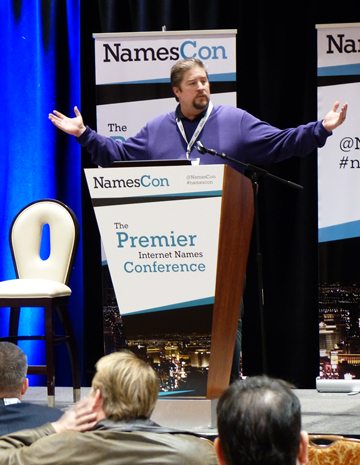
Jothan
Frakes speaking at the first NamesCon
conference in Las Vegas in January
2014. Frakes co-founded the show with
Richard Lau. |
"Many Top
Level Domains traded hands in 2016 (we will
see more of this in coming times) and there
were two very noteworthy events in 2016 -
which were the announcement of registry back
end provider projects. One was the Nomulus
project (a collaboration between Google
and Donuts) for a registry platform,
and the other was the qualification of the Canadian
'CIRA' (They run the .CA ccTLD and
now .kiwi) Fury platform for new
gTLDs. The new TLDs that exist are
always looking to optimize costs and have
choice and competition. Back End Service
providers that were not part of the 2012 TLD
application round, but there was not a way
prior to Fury being approved for a back-end
provider to be vetted in a manner consistent
with the panel reviews that had occurred for
the new TLDs. This precedent means that
we will see registries seeking better costs or
services, or even creating their own
integrated registries for innovation.
Though this impacts the channel more than the
end-user or registrant, it might hopefully
play out as savings in registration fees - or
stem the tide of wholesale fee increases per
name in TLDs - where it becomes harder
and |
|
harder for a
registry to whine or justify 7-10% annual
increases in the presence of cost
competition reducing fees." |
"Consolidation
will continue in 2017. The Open registry and NCC
Group's TLD business was acquired by KeyDrive at
the very front of the year, and we will no doubt see a
trend of M&A within the business continue
throughout the year. The good news is that this means
that there continue to be cycles of opportunity
- the moves and changes often give way to new company
formations as teams and structures change through
acquisitions. After watching waves of these
cycles, smarter companies fight to keep the talent
around and continue or grow their market positions,
while other companies restructure and exit people who
go work for (or become) their competition."
"Startup
opportunities still abound. Yes, someone maxed out the
taxi-disruption service. Yes, there's an app for
everything you can think of. Execution,
capabilities and talent are often the big difference
that makes for the success or failure of startups, not
just capital. A domain name can be a big
part of this, but it is just a part. If you're
the person with the 'category killer' domain name, be
sure you can kill that category. If your domain
is just a booster rocket for an existing project that
someone else is building, watch for that person who is
'all in' on their concept, and keep in mind that their
perspective is that they have to hand you their kid's
college education money for something that should be
around 25-50 dollars. Leasing names or equity
share is starting to become the new trend in getting
startups the best domain names, and we will likely see
leasing trends increase in the coming year."
"The
Internet as we have grown to know and love it will
undergo quite a large number of changes in 2017-2018.
Within the US, Net Neutrality, and other
free-flow concepts that have been the baseline
expectation and platform for innovation, choice and
opportunity have a lot of potential to be under
threat. This does not necessarily mean disruption to
the opportunities within the domain name space, but it
does represent potential for changes - some possibly
good - in the flow of information, goods, services,
and money."
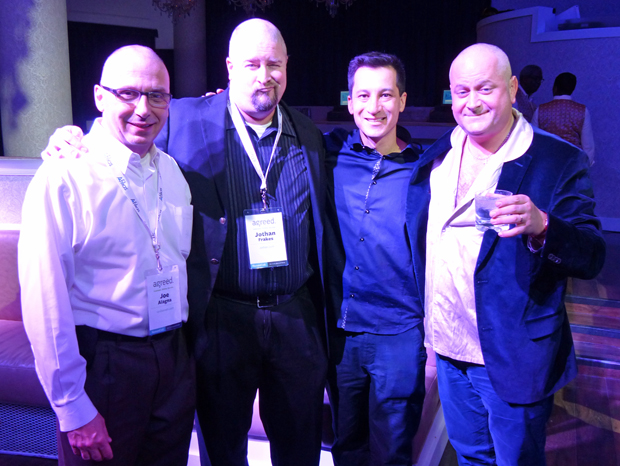
(Left
to right) Joe Alagna, NamesCon Co-Founders
Jothan Frakes and Richard Lau and Yancy
Naughton after Alagna, Frakes and Naughton allowed
their heads to be shaved in a fundraising
effort for the Water School held at the
firstl NamesCon conference in Las Vegas,
January 2014.
"Clearly
we will see some changes in the new leadership within
the Presidency and balances within the branches of
government within the USA. I closely follow
updates from the DNA, ICA and i2C to help sift through
the various announcements and understand how they
might impact me or my interests."
".COM
and .NET thick whois are coming. That's
going to be big, as it shifts the contact detail for
names away from being held at the registrar, making
the contact details available to the registry that
will be operating .WEB."
"Will
we see market forces allow for cross ownership within
the largest industry player, with Verisign
cross-owning an integrated registrar? This
remains to be seen, but in possession of what
would essentially be the entire database of
registrants globally (at least those not under
privacy), it would put Verisign in a even more
dominant than dominant position than they currently
enjoy as registry for the .COM TLD."
|
|
Bill
Sweetman
President & Lead Ninja, NamesNinja
Bill
Sweetman has been an internet
professional for well over 20 years with experience
in just all aspects of the industry. His skill set
has made NameNinja one of the top consultants
in our field.
|

Bill
Sweetman
President & Lead Ninja
NameNinja |
"What
struck me as notable about 2016 were the
sheer volume of large domain portfolio
transactions (GoDaddy scooping up
several big ones for seven-figures) along
with consolidation in the registrar
and registry space (larger players
swallowing smaller players). It's becoming
harder and harder to keep track of which
company is now owned by which larger
organization, and which TLD is operated by
which entity; someone should produce an
infographic to map this messy spider web
out!," Sweetman said.
"I imagine that 2017 is going to be a
year of stark contrast. I expect
we're going to see some exciting, innovative,
and high-profile DotBrand launches
along with, unfortunately but not
surprisingly, some catastrophic failures
by some of the smaller, independent new gTLD
operators who are in over their heads."
"While the
Chinese domain buying 'bubble' of Q4 2015 is
now a distant memory, I don't think we
should write China off as having the
potential to make another huge impact on the
domain industry. India, too. I, for
one, will be watching the US startup and
technology market carefully as it adjusts to
the new government. If the |
|
venture capital
money starts to dry up, I think that will
have a dampening effect on some big-ticket
domain sales." |
Scott
Reynolds
Vice President of B2B Services, Payoneer.com
After
years of being dominated by Escrow.com, providing
escrow services to domain buyers and sellers has
suddenly become a very competitive space. The
battle was ratcheted up considerably when
deep-pocketed Payoneer.com joined the fray.
Payoneer, represented here by Vice President of B2B
Services Scott Reynolds,
even enlisted former Escrow.com President Brandon
Abbey as a Senior Adviser.
|

Scott
Reynolds
Vice President of B2B Services
Payoneer.com |
"2016 has
been an eventful year in the escrow payments
space, particularly with the major
announcement that Armor Payments was
acquired by digital payments industry leader
Payoneer. In one fell swoop, the
escrow payments space has gone from a fairly
sleepy industry served by relatively small
players to one that is seeing significant
growth and innovation," Reynolds
said. "Now, buyers and sellers of
domain names have a viable alternative to
take advantage of licensed secure payment
services, backed by a global, well
established company with millions of
users."
"As the
world continues to flatten, we see more and
more small and medium sized businesses look
beyond their borders to find new customers
and source from new suppliers. The
domain industry is no exception. At
Payoneer we expect cross-border commerce to
continue to grow, particularly from the Asia
Pacific region. Buying and selling
from individuals and businesses abroad is
potentially risky and complex, and
traditional players like banks are not
geared up to address these SMB needs.
We expect further innovation from tech
startups focused on streamlining the
challenges of
|
|
transacting
across borders – financing, logistics
(when relevant), payments, compliance, etc."
"In terms
of challenges, when industries gain
traction, regulators aren’t far behind.
While the additional regulation provides
security to consumers and businesses, it
adds a layer of operational complexity and
increased cost for the payment providers.
Payoneer has always invested a huge amount
of resources in licenses around the
world, and in addition to our escrow
license, we will continue to ensure that we
keep the highest regulatory standards,
across all the regions we currently support." |
Stevan
Lieberman
Attorney, Lieberman
& Greenburg
Moving
on to the legal field we have commentary from three
of the domain industry's leading attorneys for you.
One of those, Stevan
Lieberman, is also a successful
entrepreneur whose interests include DigitalCandy.com
and Escrow.Domains.
|

Stevan
Lieberman
Managing Attorney
Lieberman & Greenberg |
"2016 has
been an interesting year," Lieberman
began. "Just a few of the significant
events last year (some overall and some for
our industry specifically) were:
1. Substantial greater acceptance of
new Gtld’s by the general public
2. Fake news abounds
3. The Internet Assigned Numbers
Authority transition - Consolidation of
ICANN (naming) and IANA (numbering) into a
single organization, which is now
supranational. And is a not for profit, with
one half billion cash in the bank and
growing.
4. Verisign Contract extended to 2024
5. .Web extension sells for $135
million and law suits abound
6. Chinese domainers invest heavily
7. Chinese Gov mandates new rules for
Registries
8. Massive investment in Block Chain
technology (by Donuts and others)
9. Judicial redress Act signed –
privacy laws extended between US and Europe
10. Ename goes public
11. Major companies (Microsoft and
Google and others invest heavily in
Augmented reality (Hololens & Magic Leap
and AI)
12. Trump is elected president
13. WordPress buys .Blog
14. Large amount of consolidation
within the industry (large companies buying
smaller ones)" |
|
Regarding
2017, Lieberman said, "I expect: A
greater interest in privacy by the
public which goes hand in hand with less
trust of the government by the public.
The election of Trump shows this
along with the dissatisfaction of much of
the citizenry of the state of the union.
However I expect the government to increase
its attempts to have greater and greater
access to private company’s data of its
users and to be able to filter the Internet
for what it believes are bad actors to
continue. This will result in the
stepping on citizens privacy rights to a
much larger degree. Accordingly we will see large
numbers of law suits in 2017 on these
subjects."
"We
also see a number of law suits against ICANN
pertaining to how it controls new registries
and expect further such law suits.
Government control will also lead to terser
control over the movement of money (we are
already seeing this in the new
identification, money laundering and know
your client rules) which will lead to
greater barriers to general transactions.
We however did not see much stopping
industry roll up and expect even less
control over such rollups becoming de-facto
monopolies in 2017 (you know which
companies have the majority control over the
domain name industry)."
"All
of this sounds pretty negative, but I also
expect there to be a lot more money in
the industry due to interest in the new
TLDs, continued uptake in alternative ccTLDs
(China and India), and the massive
diversification of domainers into
alternative monetization methods forced on
them by the dying off of basic PPC (the
silver lining)."
|
Zak
Muscovitch
Principal, The Muscovitch Law
Firm (DNAttorney.com)
Veteran
Toronto-based attorney Zak Muscovitch is an
acknowledged expert on UDRP issues and has
helped countless domain owners successfully fight
off attempts to take their assets through misuse of
the UDRP
process.
|

Zak
Muscovitch
Principal, The Muscovitch Law Firm
DNAttorney.com |
"The
first trend that I have seen in 2016, is
that Domain name investors have come under renewed
attack by overreaching trademark,"
Muscovitch said. "I have noticed an
increase in UDRP complainants arguing that
they should be entitled to a domain name
even though the domain name was registered
by the registrant BEFORE the
trademark was even adopted by the
complainant. The reason for this appears to
be that new companies are going after old
domain names."
Until
2009, it was a nearly certain that the UDRP
required both “bad faith registration and
“bad faith use”, and that “bad faith
registration” was of course impossible if
the domain name owner registered a domain
name before the brand was even a twinkle in
the eye of the trademark owner. However in
2009, a handful of rogue UDRP panelists came
up with a handful of decisions, starting
with Octagen,
that attempted to “re-write” the Policy,
so that a domain name that was clearly
registered in good faith, could be turned
into a “registration in bad faith”.
These misguided panelists took the
position that if the domain name owner
registered the domain name in good faith,
but |
|
subsequently renewed the domain name in bad
faith, i.e. by subsequently using the domain
name in an infringing manner once a
complainant’s trademark rights arose, that
a domain name could be transferred."
"Fortunately,
the consensus remained amongst most UDRP
panelists, that this approach totally
misinterpreted the Policy, and that a
“renewal” does not amount to a new
registration. Very recently, one excellent
panelist, Mr. Adam Taylor, in TOBAM
v. M. Thestrup / Best Identit,
hopefully put one of the final nails in this
misinterpretation of the Policy, when he
concluded that “the Respondent could not
have set out to target the then non-existent
rights of the Complainant”, and that was
fatal to the UDRP Complaint."
"Nevertheless,
I have seen that a lot of high value domain
names that have been owned by domain name
investors for well over 10 years come under
attack by companies that only started in
business a few years ago. These new
companies obviously want the .com
that corresponds to their company name or
brand, but the domain name was already
taken. Instead of adopting a name where the
.com is available or negotiating the
purchase of the domain name from the
registrant, these new companies are trying
to get the domain name for free by
reviving the misguided and outlying
approach. Over the years, most previous UDRP
cases involved domain names that came after
the trademark, but nowadays, those may have
mainly worked their way through the system
already, and it may be that we are seeing a
“new kind” of UDRP case where the
trademark comes after the domain name,"
Muscovitch noted.
"Accordingly,
until this errant approach is finally put to
rest, domain name owners – even ones who
have owned their domain names for 20 years
– must be ever vigilant as to how
they are using their domain name. Using an
old domain name for PPC could easily
turn into a UDRP for the unwary domain name
investor, as in the intervening 20 years, a
trademark could have arisen, and the
trademark owner my take a wild and expensive
shot at the domain name using the
“retroactive bad faith” approach."
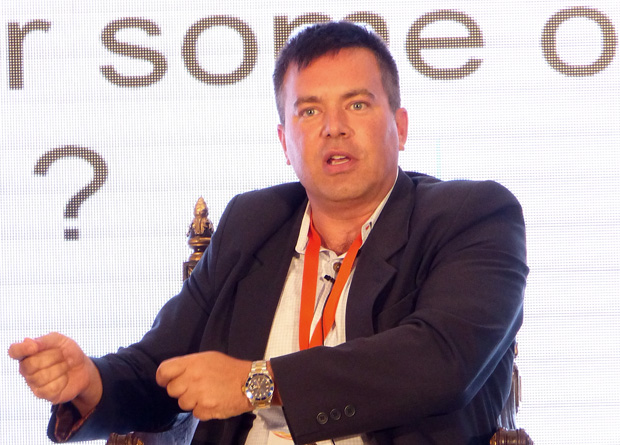
Zak
Muscovitch speaking at the 2015 DomainX
Conference in Bangalore, India.
"The
second trend for 2016 that I see, relates to
domain name transactions rather than
domain name disputes. This past year, I have
noted an increase in high value domain name lease
or “financed” purchase
transactions. Values for high quality
generic and brand-able domain names have
clearly reached a point where a start-up or
existing company who wants to adopt a new
brand, in many cases realizes that they
cannot afford to purchase the domain name
outright, so they therefore pursue alternative
acquisition models. For example, I have
seen more than the usual number of
six-figure domain name “lease to own,
“options to purchase”, and “financed
purchases” transactions for decent
generics and brand-able domain names. This
is a marked difference from the past, where
such transactions were less common and
outright sales were the norm. As the value
of domain names continues to increase, we
can expect to see more and more of such
transactions which enable a purchaser to
start using a valuable domain name right
away, but pay for it over time."
"In
2017, UDRP reform will be a major
challenge for the domain name investment
community, and the Internet
Commerce Association will be
able to meet that challenge with its
increased capacity. ICANN established a
Working Group that will be dealing with UDRP
reform in 2017, and this Working Group is
mandated to review the UDRP which has not
undergone any changes to the Policy since it
was first established in 1999. Accordingly
this is a major development that
could lead to profound changes for how the
valuable property owned by domain investors
is treated. The trademark lobby may attempt
to use this Working Group to push through
radical changes that may fundamentally
decrease the fairness of the UDRP procedure.
Fortunately, the ICA has never been better
positioned to address such challenges. The
ICA has now increased its Board members to
five from three, adding in myself and Jay
Chapman from Digimedia. Nat
Cohen continues to serve on the Board,
and Ryan Pierce of Rook Media
has also recently been appointed, having
replaced Daniel Law who has taken on
the position of Executive Director. In
addition, Phil Corwin continues to
lead through his role as General Counsel to
the ICA, and Kamila Sekiewicz
continues in an expanded role as Operations
Manager. Jeremiah Johnston, who has
been with ICA from the beginning, continues
his incredibly valuable leadership role as
President of the organization."
|
"By
increasing Board membership, the ICA
has increased its capacity to work
on behalf of the domain name
investment community. Nat Cohen, Jay
Chapman, Jeremiah Johnson, Ryan
Pierce, and myself are all volunteering
our time to advocate on behalf
of the domain name |

|
|
investment
community through a UDRP Reform
and Domain Name Theft working
group, by representing ICA at
industry events, and by helping
coordinate and develop ICA’s
direction and initiatives. The
appointment of Daniel Law as
Executive Director, is particularly
special, as the ICA will have an
unprecedented ability to continue
its important work and even expand
on it through an increase in
membership and ICA initiatives. Phil
Corwin, is a Co-Chair of the ICANN
Working Group that is engaged in
reviewing the UDRP, and is therefore
in an incredible position to monitor
its work and continue to advocate
for the ICA’s members in his
capacity as General Counsel. Kamila
Sekiewicz fulfills a crucial role by
helping to coordinate all ICA
activities and making things happen,
including some fantastic work
increasing the ICA’s membership,
and her assistance will increase in
2017. Accordingly, the ICA is in the
enviable position, with the generous
support of ICA members, to greatly
expand its work in 2017, through
its greatly increased
capacity." |
|
Phil
Corwin
Legal Counsel, Internet
Commerce Association
Zak
Muscovitch's comments above about the Internet
Commerce Association (in the two paragraphs
above) is a perfect introduction to Phil Corwin,
the man to whom I want to give the last word in this
year's State of the Industry report, because of the
extremely important and effective work he and the
ICA has done over the past decade and continues to
do in protecting the rights of domain owners.
|
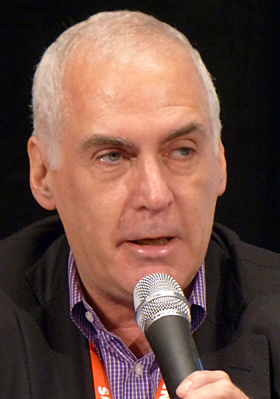
Phil
Corwin
Legal Counsel
Internet Commerce Association |
"From
a public policy perspective, the most
significant event of 2016 was the completion
of the IANA Transition on October 1st
and the ending of a unique US government
relationship with ICANN," Corwin
said. "It remains to be seen whether
the GAC
will remain content to have a merely
advisory role in the newly emancipated
ICANN, as early signs are that it may be
flexing its muscles and seeking at least a
coequal role with the community-based GNSO
Council in setting ICANN policy going
forward. There are also rumors that the Trump
Administration may try to “claw
back” the IANA contract or, in the
alternative, try to assert some unique
continuing US powers over ICANN; if that
occurs, it may invite a variety of
destabilizing responses from ICANN
constituencies and the GAC."
"Another
major event was the departure of Fadi
Chehade as ICANN CEO and his
replacement by Goran Marby. So far
Marby has assumed a much lower profile than
Chehade. He is getting generally good
management marks so far, but as of now
it is difficult to identify any unique stamp
he is putting on the organization."
"With
respect to 2017, the ICANN working group (WG)
reviewing all Rights Protection
Mechanisms (RPMs) in all gTLDs, which I
co-chair, will be
|
|
moving
into the heart of its work of evaluating and
perhaps revising the new gTLD program RPMs
this year, prior to launching its phase 2
UDRP review. So far the WG is working
in fairly collegial manner, but that
may be tested as we get into the trademark
clearinghouse and related RPMs, and then
especially as we reach the URS.
Some trademark interests have indicated the
desire to add a domain transfer option to
the URS, but many in the domain investment
community fear that would be too much of a
domain hijacking risk in the context of a
rapid, limited inquiry, $500 filing fee
procedure," Corwin said.
"This
month another working group that I also
chair, on curative rights processes (UDRP
and URS) for international intergovernmental
organizations, will be releasing its draft
report for public comments. IGOs and
the GAC had asked for the creation of
a totally separate process that would deny
domain registrants the right of appeal to a
court of mutual jurisdiction, to be replaced
by another arbitration process. But the WG,
at the end of two years of work, determined
that there was no sound legal or policy
basis for such action. The GAC may try to
use the ultimate disposition of our
recommendations as a test of their role in
post-transition ICANN."
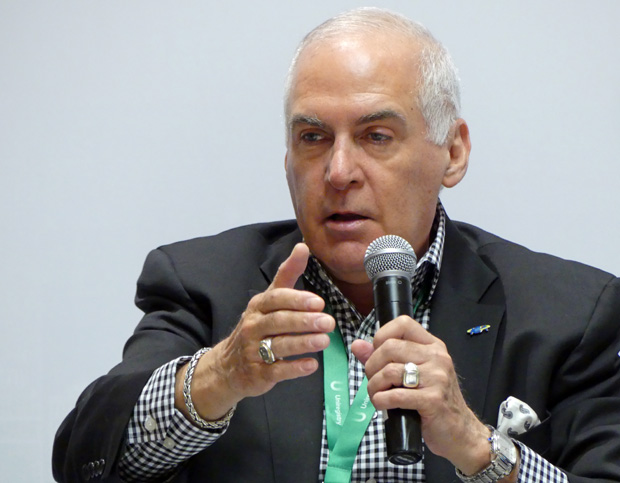
Phil
Corwin speaking at the 2016 NamesCon
conference in Las Vegas.
"Another
major event this year will be the
negotiations and outcome regarding renewal
of Verisign’s contract to operate
the .Net registry. ICA has
called on ICANN’s Board to impose a
moratorium on staff imposition of the URS on
legacy gTLDs by contract (as is pending for .XXX
and .Mobi) as the ongoing RPM review
WG is charged with recommending whether the
new gTLD RPMs should become mandatory
Consensus Policy for legacy gTLDs. The
stakes are big, given that current .net
registrations exceed 15 million.
Other issues may arise once the proposed
registry agreement is released for public
comment."
"Events
may well arise that test whether ICANN’s new
accountability measures work in
practice, not just theory. The output of the
work stream 2 accountability subgroups also
remains to be seen on additional measures
that, while deemed important, were not
necessary preconditions of the IANA
transition. The results may be a mixed
bag; for example, the transparency
subgroup is making good progress to
recommending far greater public access to
internal ICANN documents, but the
jurisdiction subgroup threatens to become
bogged down in a divisive debate on
maintaining ICANN’s corporate jurisdiction
in the U.S., notwithstanding ICANN pledges
to the Congress and NTIA
that this was a binding commitment."
*****
|
|
|
|
